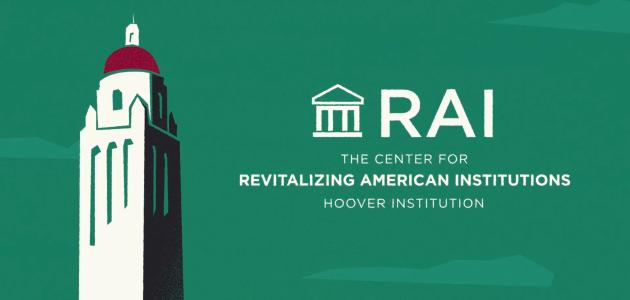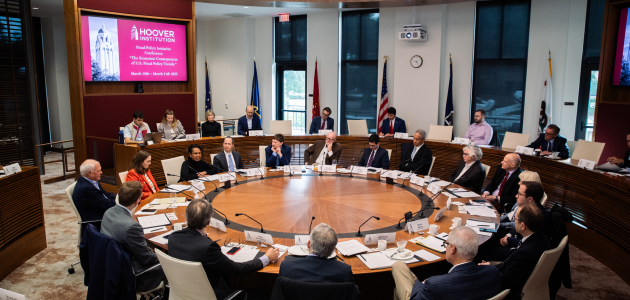(Stanford, CA) – The Hoover Institution’s History Working Group, chaired by Milbank Family Senior Fellow Niall Ferguson, hosted its first History Symposium on September 16, 2022. This year’s theme was “The History of History.”
In Blount Hall, historians and academics from related fields convened to discuss five papers that focused on the state of historical discipline at colleges and universities across America.
The Symposium began with Ferguson’s opening remarks, which explored possible explanations for the steep decline of university history majors in the last three decades. This trend has tracked a wider reduction of humanities majors, especially English. In contrast, computer science has been the fastest-growing major at Stanford and other top universities. Thus, one possible explanation for the dearth of history BAs is that many undergraduate students have concluded that it won’t translate into well-paying careers.
Ferguson offered other possible reasons for the decline of undergraduate interest in history. These include large proportions of educators who reveal their ideological biases in the classroom, as well as the shift away from the study of consequential national and international events in favor of excessively narrow areas of subject matter.
For Ferguson, there is a cause for concern for a society where there isn’t a firm foundation of historical understanding. A lack of practice examining evidence and sources, for example, make Americans more likely to be deceived into entertaining conspiracy theories such as those disseminated on the internet during the COVID-19 pandemic.
“I am not saying that the study of history will necessarily vaccinate you against that kind of magical thinking,” Ferguson concluded. “But if history ceases to be a part of the way people are taught as undergraduates, and if history itself ceases to teach the kind of critical reading of sources, which I think is fairly fundamental to what we do, then it wouldn’t be too surprising if we ended up with a social problem.”
The Symposium ended with Kate Epstein’s closing remarks. Epstein, who is associate professor of history at Rutgers University, discussed the connection between the current state of historical thinking and the dysfunction in American politics. History, like other humanities, embodies two mutually reinforcing commitments. The first is a substantive humanistic commitment to understand human beings in their complexity. The second is a procedural commitment to respect historical evidence.
Quoting William Appleman Williams, Epstein said, “The method of history is neither to by-pass and dismiss nor to pick and choose according to preconceived notions; rather it is a study of the past so that we can come back into our own time of troubles having shared with the men of the past their dilemmas, having learned from the experiences, having been buoyed up by their courage and creativeness and sobered by their shortsightedness and failures.”
For Epstein, humanism and proceduralism used to reinforce each other. Now, the feedback loop is in reverse, a dynamic which is evident not only in the decline of the historical discipline, but in the erosion of liberal-democratic standards in both the American political left and political right.
The five papers discussed are as follows:
“Booms, Busts, Power Laws, and Networks: Computational History, and a History of History Since 1870,” September 2022.
By Manny Rincon-Cruz, Executive Director, History Working Group, Hoover Institution
Summary
Manny Rincon-Cruz describes the value of applying new computational methods in conducting research of vast archival collections that cover long ranges of time. He argues that the numbers of undergraduate and PhD students have gone through booms and busts, even as higher education in general has experienced uninterrupted expansion since the post–World War II era. Rincon-Cruz also explains that a small number of faculty employed by prestigious and well-networked universities have been prolific in the number of doctoral students they advised. Intellectual descendants of these “super advisors” have subsequently joined the ranks of other major higher educational institutions. Rincon-Cruz adds that the 1960s and 1970s faculty cohort was exceptionally large in comparison to their older colleagues. Thus, these younger scholars had a disproportionate impact on the newly professionalizing historical profession, changing its methods and likely tilting its political composition.
Chair
Tyler Goodspeed, Kleinheinz Fellow, Hoover Institution
Discussants
Charles S. Maier, Leverett Saltonstall Research Professor of History, Emeritus, Harvard University
Stephen Kotkin, Kleinheinz Senior Fellow, Hoover Institution
“The Purple Pill: Charlottesville in Retrospect and Prospect,” American Purpose, August 2021.
By Kate Epstein, Associate Professor of History, Rutgers University-Camden
Summary
Kate Epstein argues that both the New York Times 1619 Project and the Donald Trump–established 1776 Commission see themselves as defenders of the historical truth about the nation’s founding while casting opponents as promoters of ideologically motivated mythologies. She maintains that the proper role of the historical profession is to resist this sort of weaponization and instead help Americans understand the past in all its complexity, and as much as possible on its own terms.
Chair
Peter W. Wood, National Association of Scholars
Discussants
Jennifer Burns, Associate Professor of History, Stanford University; and Research Fellow, Hoover Institution
James Hankins, Professor of History, Harvard University
“Today My Father Would Be a Heretic: Therapeutic History and the Demise of the Profession in the 21st Century.”
By Richard A. Landes, Senior Fellow, The Center for International Communication, Bar Ilan University (Israel)
Summary
Richard Landes explains that the decline of the impartial study of Western civilization correlates with the dominance of progressives at the university, a group whom he characterizes as “pack academics,” who are more concerned about advancing political correctness than exploring meaningful historical issues. The paper also provides a critique of anthropologist Jared Diamond’s book Guns, Germs, and Steel. Landes argues that Diamond’s thesis about the differences between the West and other civilizations is greatly flawed because it principally rests on environmental determinants, while failing to account for cultural characteristics.
Chair
Peter W. Wood, National Association of Scholars
Discussants
Jennifer Burns, Associate Professor of History, Stanford University; and Research Fellow, Hoover Institution
James Hankins, Professor of History, Harvard University
Chapter Excerpts from Empire of Ideas: Creating the Modern University from Germany to America to China. Cambridge, Massachusetts: Harvard University Press, 2022.
By William C. Kirby, T. M. Chang Professor of China Studies and Spangler Family Professor of Business Administration, Harvard Business School
Summary
William Kirby traces the evolution of the modern university system over the last two centuries, from its founding in Berlin in 1810. He describes how the German system was emulated in the United States, which became a model for academic excellence in the second half of the twentieth century. Kirby also discusses the remarkable growth of Chinese universities and examines the prospects for the PRC setting global educational standards in the twenty-first century.
Chair
Daniel Sargent, Associate Professor of History and Public Policy, University of California, Berkeley
Discussants
Wilfred McClay, Victor Davis Hanson Chair in Classical History and Western Civilization, Hillsdale College
Matthew Lowenstein, Hoover Fellow
“America’s Medieval Universities,” American Affairs, May 2022.
By Nick Burns, Editor and Social Media Manager, Americas Quarterly
Summary
Nick Burns argues that "the American university now serves as a hedge fund operator, real estate developer, start-up incubator, and the largest employer in two-thirds of the country’s largest one hundred cities.” Yet the modern university in the United States is a strange, hybrid institution. As Burns argues, it can trace its antecedents back to medieval Europe. In the American context, however, the walled college has become “a totalizing community,” made more intrusive in its surveillance by the opportunities for social control created by the Covid-19 pandemic. Burns concludes that we face a choice: either “a partial neo-feudalization of the modalities, if not the class structure, of modern society, a process already underway” as campus culture infects the corporate world; or “the creation of institutions of education and knowledge production on a more modern model, of which history and international comparison provide several examples”—such as the French École normale supérieure and the other grands écoles.
Chair
Daniel Sargent, Associate Professor of History and Public Policy, University of California, Berkeley
Discussants
Wilfred McClay, Victor Davis Hanson Chair in Classical History and Western Civilization, Hillsdale College
Matthew Lowenstein, Hoover Fellow
Click here to learn more about the Hoover Institution’s History Working Group.














